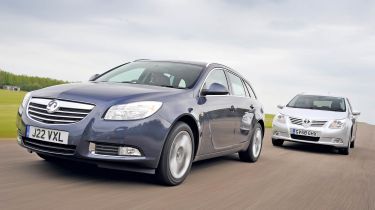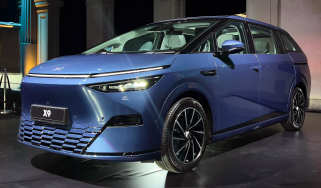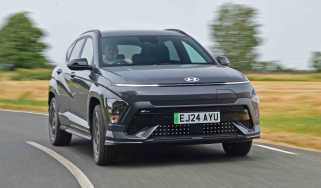Insignia 1.6T vs Avensis 2.0
In our first match-up, Vauxhall’s new turbocharged Sports Tourer takes on Toyota’s classy estate. Which is the more versatile family car choice?
Turbo badge fixed to the back of a car used to mean only one thing – tyre-shredding pace. Not any more. The new Vauxhall Insignia is a case in point. It’s the only turbo car in our line-up to feature a tell-tale logo on its bootlid – but this practical estate is no performance model. Neither is the Toyota Avensis Tourer. Its normally aspirated 2.0-litre petrol unit is tuned for economy and low emissions rather than speed. So, which is better suited to the demands of family motoring?
The headline power and torque figures tell their own story, because the turbocharged Insignia has 177bhp and produces 230Nm of torque. In comparison, the normally aspirated Avensis can only muster 150bhp and 196Nm. Predictably, the Vauxhall was quicker against the stopwatch at our test track, although it doesn’t feel as fast as its power output would suggest.
It sprinted from 0-60mph in 8.6 seconds – seven-tenths faster than the Toyota. With a hefty torque advantage, the turbo Insignia pulled even further ahead in-gear. It covered 30-50mph in fourth in seven seconds exactly, which is 2.9 seconds quicker than its rival. On the road, this performance advantage means the Insignia is the more relaxing car to drive.
Used - available now

2023 Peugeot
208
21,041 milesManualPetrol1.2L
Cash £13,198
2020 Hyundai
i20
22,199 milesManualPetrol1.2L
Cash £11,427
2024 Volkswagen
Tiguan
35,662 milesManualPetrol1.5L
Cash £16,500
2023 Hyundai
i20
17,285 milesManualPetrol1.0L
Cash £12,200Maximum torque is available from only 2,200rpm – 1,800rpm lower than in the Japanese model – so it pulls strongly even at low engine speeds. And a linear power delivery means the Vauxhall feels as though it uses a large-capacity normally aspirated powerplant. Switch to the Toyota, and it’s clear that you have to work its smooth 2.0-litre unit hard to make the most of its performance.
In estate guise, the extra hauling ability means the Insignia is a far more attractive choice, but its torquey performance does come at a price. Claimed fuel economy of 35.8mpg won’t win any prizes; its rival has an official combined figure of 40.9mpg. If you drive 12,000 miles a year, that equates to an extra £186 on your annual fuel bill if you take the turbo option. The extra spending doesn’t end there.
As well as inferior economy, the Vauxhall has CO2 emissions of 186g/km. The Toyota puts out only 164g/km – which is enough to significantly lower its road tax banding. Avensis owners will pay £150 for their annual disc, compared to £215 for the Insignia. Combined with the extra cost of fuel, that means you’ll be £251 a year better off with the Toyota.
In our hands, the Vauxhall returned real-world consumption of 28.8mpg – some way short of the official figure. The slower Toyota managed 29.5mpg, which reflects the fact that you have to drive it harder to keep pace.
The engines aren’t the only things that separate these two, though. On the road, the Insignia feels much sharper to drive than its rival, with assured handling to match its stronger performance. The Toyota is more comfortable and refined, and in T4 trim it comes better equipped. Leather upholstery, a Bluetooth phone connection and dual-zone climate control are all fitted as standard. In Exclusiv Nav spec, the Insignia features satellite navigation, but has fabric seat trim and manual rear windows.
The lower spec and higher running costs are easy to forgive when you look at the Vauxhall’s list price. At £20,250, it costs £985 less than the Toyota. However, company drivers will benefit from running the Avensis. Although it’s more expensive to buy, it will cost standard-rate payers £166 less in tax each year.
With its stronger performance, sharper handling, more attractive looks and higher quality cabin, the Insignia takes the win – first blood to the turbos. Even so, it’s far from being a convincing start for the boosted powerplants. Will our other head-to-heads make the case for turbos more or less compelling?
Economy
Small turbo petrol models should be cleaner and more efficient than their larger-engined rivals – but that’s not the case here. Toyota’s claimed 40.9mpg is 5.1mpg better than the Vauxhall’s, and the Insignia’s 186g/km CO2 output is poorer, too.


